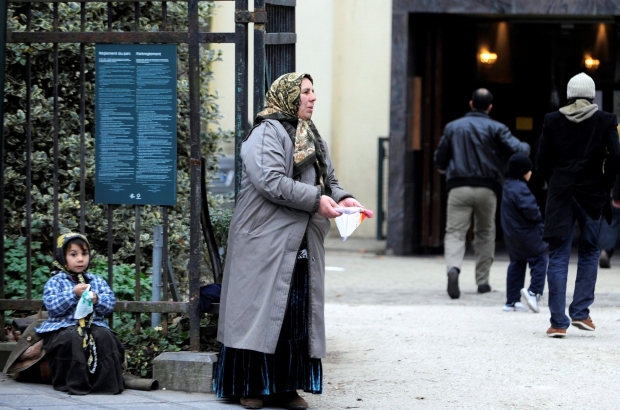- Daily & Weekly newsletters
- Buy & download The Bulletin
- Comment on our articles
City of Brussels introduces new regulations on begging with minors
The City of Brussels will ban begging by adults who are accompanied by minors under 16 years of age after a new regulation has been presented to the municipal council on Monday. Beggars with children could be subjected to a maximum fine of €350, although the authorities have said that they first want to address the problem through mediation and prevention.
As specified in the new regulation, “any police officer will first be required, at first contact with the beggar accompanied by a minor under 16 years of age, to inform him or her of the prohibition,” but also, of "the compulsory schooling of children from five to 18 years of age for which he or she is responsible." The officer should also make the beggar aware of “the support missions set up by the Public Centre for Social Welfare (CPAS), the right to benefit for children from two-and-a half-months to three years, and the right to a place in a reception centre where all the costs are covered by the city."
Parents will also be reminded of the possibility "to enrol any child from three to 18-years-old in a school within the city and to see all school fees covered by the city (including lunch)".
The objective of the regulation is therefore not to punish in the first instance but to offer support.
According to the authorities, "the city is strengthening street and prevention work to proactively reach out to this section of the public in order to raise awareness of the importance of ensuring a safe and fulfilling living environment for children, implementing the conditions necessary for the proper development of the child, education and compulsory schooling and offering them comprehensive psychosocial support and accompaniment in order to promote their social integration and give them access to rights."
While mediation and support will be the first priority, a fine can be administered if the beggar with child is approached again by an officer within a 24-month period of the first encounter.
The begging of minors is a recurring problem for large urban centres. The debate has often been intense between pro- and anti-sanctions. Begging has not been prohibited since 1993 but cities and municipalities can choose to regulate it. Since 2017, the City of Brussels has been working on its own regulation around begging. More recently, the opposition Reformist Party in the City of Brussels introduced its own motion to fight against aggressive begging, network begging or child begging.
With this new text, the aim is therefore to focus on the development and safety of the child but also to fight against begging networks, which are very active in Brussels according to a recent report by the non-profit organisation BRAVVO.
"BRAVVO considers that the most worrying findings reported by the field team is the begging practiced with children,” the City of Brussels says. “The report states that begging networks operate in the Brussels territory and expand their begging activities by recruiting new members among the families on the street who are victims of homelessness, offering them an income and a roof over their heads in exchange for sharing their earnings."
According to a recent survey by local police services, "since the deconfinement following the Covid19 crisis, the phenomenon of begging has resurfaced on the territory of the City of Brussels, in parallel with the resumption of economic life (and in particular the hospitality sector) and the return of tourists."
In addition, "83 families or 271 beggars of Romanian origin (Roma) have been registered by the police services as professional beggars on the City’s territory, 10% of whom are minors."
The authorities also specify that beggars with children "almost systematically" refuse the social assistance offered by the field teams.
Finally, the police report adds, "part of the population in question often travels in groups, made up of young families with young children. Their goal would be to generate as much money as possible over a period of six to eight weeks and then leave the territory with the money collected on a cyclical or recurring basis. This is why a significant portion of these families gather in temporary sleeping places which are built in the evening and dismantled in the morning. Some nights, up to 70 people are counted in one such place, often with very young children."


















Comments
Thought full . Indeed prevention and informing about corrective actions will lead good people lead better life..
Kids have a right to receive an education. Parents have a duty to make sure their kids are educated. We have as a society a responsibility to make sure ALL children are educated. If they are on Belgian soil, they have to respect our laws.